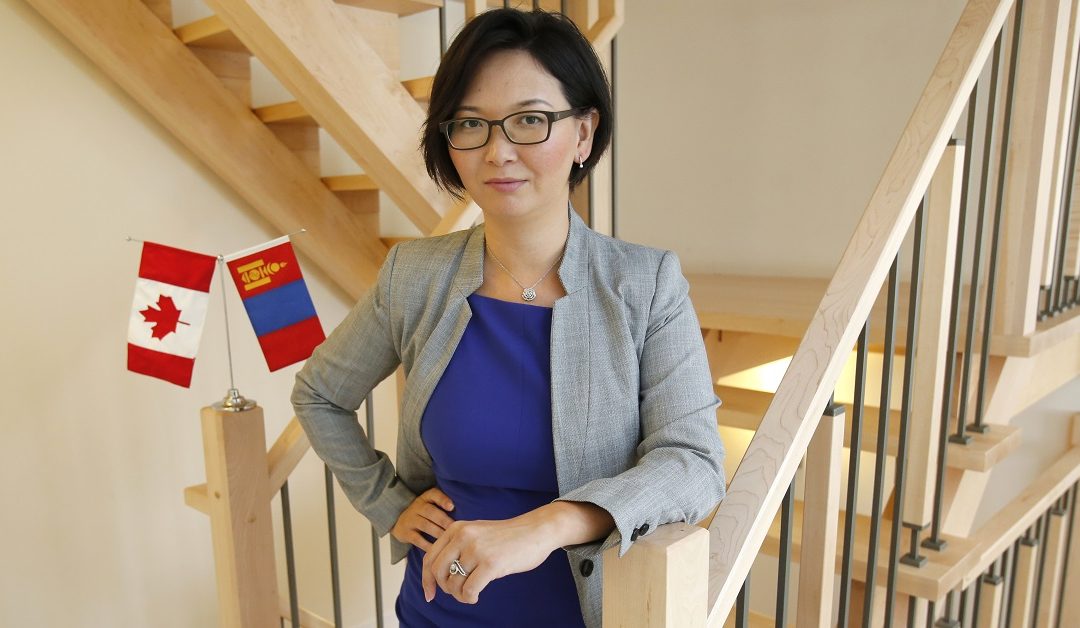By Natalie Bruckner. Originally published in the fall 2018 edition of Business Class magazine.
When Bolor Sambuu graduated from UVic in 2011 with an MBA in entrepreneurship and a newfound appreciation for sustainability, mining wasn’t exactly top of her list as a sector to explore. “Sustainability and mining are a bit of a contradiction in terms,” laughs Sambuu. “No one leaves university, especially after those specializations, and wants to work for a mining company.”
And yet, Sambuu credits the MBA program with opening her eyes to new values in new ventures. “I was taught to look at things from all angles and realized I could make more of an impact from within an organization,” she says. And as a native of Mongolia—a country where mining is one of the top industries and a primary driver of bilateral commercial relations with Canada—it was a sector where she felt she could bring her unique insight and have the biggest impact.
Today, Sambuu uses networking and education to foster sustainable trade between Canada and Mongolia. She is the founder and executive director of the Canada Mongolia Chamber of Commerce in Toronto, program manager, international services at Ceso-Saco (an international economic development organization) and founder of Women in Mining Mongolia, which promotes diversity and inclusion practices within the mining sector in Mongolia.
“I didn’t consciously set out to promote sustainable international trade, but when I think about it, the idea of sustainability has always piqued my interest. As humans, our nature is to try new things and be curious. So if it’s done sustainably, why shouldn’t we promote international trade, too?”
Having a truly global perspective helped Sambuu value the importance of fostering trade development. “When I was 10, my father got a job as a trade commissioner at the Embassy of Mongolia in Poland. I attended a Russian university, and that provided me with international exposure. We returned to Mongolia once his term was over, but I went back to Poland after winning a scholarship for the Warsaw School of Economics. Poland is really my second home.”
From there, Sambuu went to study English in the US before applying to UVic. After receiving her MBA, Sambuu made a mistake that she believes is common among international students: she limited herself by applying only for jobs in Canada. “I was entering a very competitive market. There were few jobs in sustainability back then.”
However, her world opened up when friends visiting from Mongolia described the country’s rapid growth and suggested she return to explore opportunities there. “International students who come to Canada often feel conflicted about returning home, but you need to realize you may have more opportunities there. It’s about opening yourself up to possibilities—the global aspect of the course allows you to see that,” explains Sambuu.
Back in Mongolia, Sambuu secured a job as an IPO Specialist at Erdenes Tavan Tolgoi JSC and as a shareholder in the Mongolian Metal Exchange. “The industry was changing and this exposed me to a network that I would never have had access to if I had stayed in Canada. I got great experience under my belt and a better understanding of how global investment was impacting Mongolia and the political challenges happening within the country.” These insights proved invaluable when she finally returned to Canada in 2013.
“I came back to Canada to gain more experience, and to be close to my now-husband, who is Canadian. But I didn’t want to lose my ties with Mongolia,” she says. Instead, she strengthened them. Up until that point, two-way trade between Canada and Mongolia was limited. Canadian exports to Mongolia amounted to approximately $27.3 million in 2017, and imports from Mongolia amounted to approximately $2.5 million.
Sambuu saw an opportunity. “Within the first two weeks of arriving in Toronto I founded the Women in Mining Mongolia. I came across the Women in Mining Canada group and realized it would be a great platform to encourage networking with like-minded women in the industry from Mongolia and Canada.” Just a year later, she set up the Canada Mongolia Chamber of Commerce, with the idea of further developing the Canada- Mongolia relationship.“The government of Mongolia was starting to understand that its minerals sector is critical to its national plans for sustainable development, and Mongolia was also having a lot more influence beyond mining; the cashmere trade, for example, was starting to take off.”
Now, as Canada-Mongolia trade relations enter what Sambuu describes as “stage two” in its development, with greater investments, an exchange of ideas between the two countries and a greater networking hub, Sambuu reflects on the advice she would give graduates wishing to enter the international trade environment. “Don’t limit yourself with where or who you work for,” she says. “You may be an environmentalist at heart, but realize that you can make greater impacts from within.”


